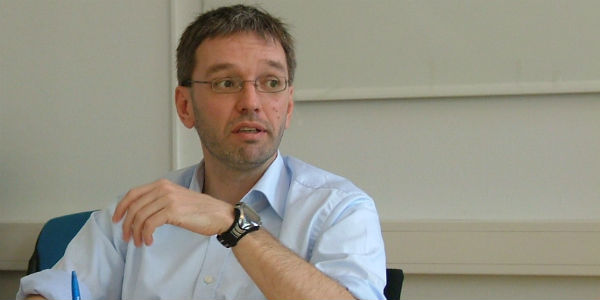Austria’s new interior minister is a man to watch – and not for the right reasons
Herbert Kickl, Austria’s new interior minister, is a man with a worrying hinterland. Although a member of the democratically-elected FPÖ, he engages with a hard right coterie – notably the Identitarian movement. Fabio Wolkenstein (University of Aarhus) warns that while power may temper some of Kickl’s extremist tendencies, it is questionable whether he should be in the cabinet at all.

Herbert Kickl in 2010. Photo: Multimedia-Blog Brundespraesident.in via a CC-BY-SA 2.0 licence
“Ladies and gentlemen, I don’t know where in Linz that there is a meeting of right-wing extremists today. I got into my car this morning and drove to a convention where people meet who do not want to let anyone take away their love for their home country, their common sense and ability to think critically. I drove to a congress where people convene for whom the European Union is certainly not paradise on earth.”
These are the words of Herbert Kickl, member of the Freedom Party (FPÖ) and Austria’s new minister of the interior. The audience he was addressing were the attendees of the “Defenders of Europe” conference that took place in Linz, Austria, in October 2016. Among the other speakers were Götz Kubitschek, the influential German “New Right intellectual” whose nativist views have often been described as right-wing extremist. The official exhibitors at the congress included the white nationalist “Identitarian” movement, as well as a number of closely related groupings. The organisers of the congress emphasised a concern with the “ethno-cultural displacement of European peoples.”
That Kickl appeared as a keynote speaker at this congress does not come as a surprise to anyone aware of his great political influence on the Austria right. The 49-year old trained philosopher is the intellectual powerhouse of the FPÖ, having been its chief strategist for several decades. Kickl has been central in shaping the image and ideology of the party, writing speeches, designing campaign slogans, and carefully planning calculated provocations of all sorts. That he will soon head one of the key ministries and be in charge of the police apparatus should give us pause.
Despite being such a key figure in the party, ultimately we know very little about where exactly Kickl himself stands politically. Asked about his own political views, he once vaguely responded that his positions cover a wide “spectrum” from more leftist views on social policy to more rightist views when it comes to law and order. However, if his keynote speech at the “Defenders of Europe” congress is any indication, it seems clear that he does not shy away from building alliances with movements on the hard right — and this means that he is a man to watch. Many of the people that Kickl described in Linz as driven by “common sense” and “love for their home country” occupy ideological positions at the outermost right fringes of public opinion, and sometimes even explicitly oppose parliamentary democracy.
As a minister, Kickl’s room for manoeuvre will be circumscribed in two ways. Firstly, given that he now has considerably practical responsibility, he will have to change his style quite a bit. While his main political role so far has been to attack the political mainstream from the opposition benches, now he will be compelled to formulate concrete policy proposals and seek compromises. Secondly, and more importantly, Kickl will be “supported” by a state secretary from the centre-right People’s Party (ÖVP), Karoline Edtstadler. This has widely been interpreted as an arrangement that serves the purpose of keeping Kickl in check by distributing some of the power over the ministry between the two governing parties. Notably, Edtstadler is an experienced legal expert who has worked as a public prosecutor in Vienna and at the European Court of Human Rights.
These caveats notwithstanding, it is questionable whether a man with his political profile should be in charge of a key ministry in the first place. Of course, the FPÖ has been elected in free and fair elections, and there is no democratic reason for why they should not be part of a coalition government. But arguably the platform on which the FPÖ has been elected is still quite far away from the views of the hard right coterie that Kickl engages with and considers ideologically innocuous. Put differently: there is still a relevant difference between right-wing populism and right-wing extremism, and while it is doubtful that the majority of FPÖ voters would endorse the latter, Kickl reaches out to groups that may straightforwardly be described as extremist.
Another reason to look with worry to Kickl’s appointment as a minister in the next Austrian government it so see it as contributing to the “normalisation” of multiple new extreme right-wing movements, most notably perhaps the Identitarian movement. Groupings of this sort tend to present themselves as democratically legitimate “patriotic” social movements. The fact that Kickl appears to support that narrative lends it further credibility. Now someone who finds nothing problematic in these movements will hold a powerful political office, sworn in by a Green president. In this sense, it is also worth noting that Kickl has appointed Alexander Höferl as his director of communication. Höferl has up until now been the editor-in-chief of the hard right news outlet unzensuriert.at, which has close links to the German New Right milieu around Götz Kubitschek and may be described as an Austrian version of the infamous Breitbart News.
In sum, there is good reason to keep a watchful eye on Austria’s next minister of the interior. Of those FPÖ members who will now hold ministerial offices, Kickl is by some distance the politically most suspect one, which is exemplified by his alliance with hard right fringe groups. Even if there remain many open questions about his political views, there are good reasons to doubt that they all fall squarely within the purview of what in Italy is sometimes called the “arco costituzionale” — the constitutional arch, which involves a commitment to parliamentary democracy, human rights, and opposition to fascism.
This post represents the views of the author and not those of Democratic Audit.
 Fabio Wolkenstein is Assistant Professor at Aarhus University and researcher at the University of Amsterdam (UvA). His work has appeared in such journals as the American Political Science Review, the Journal of Common Market Studies, Party Politics, and Political Studies. He holds a PhD from the London School of Economics and Political Science.
Fabio Wolkenstein is Assistant Professor at Aarhus University and researcher at the University of Amsterdam (UvA). His work has appeared in such journals as the American Political Science Review, the Journal of Common Market Studies, Party Politics, and Political Studies. He holds a PhD from the London School of Economics and Political Science.





 Democratic Audit's core funding is provided by the Joseph Rowntree Charitable Trust. Additional funding is provided by the London School of Economics.
Democratic Audit's core funding is provided by the Joseph Rowntree Charitable Trust. Additional funding is provided by the London School of Economics.
We must remain vigilant, soberminded, an excellent article, we must not disavow the root cause of why there remains unfettered immigration to begin
with. As if now soft fascist far-right galvanized by common cause will not be limited to just migrants only. What about COE-Centre of Excellence for Countering Hybrid Threats based Helsinki, Finland, certainly a Nato/EU joint operation.